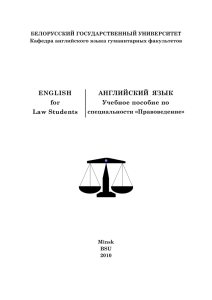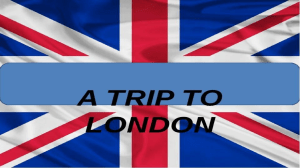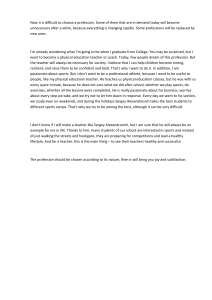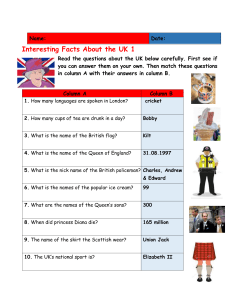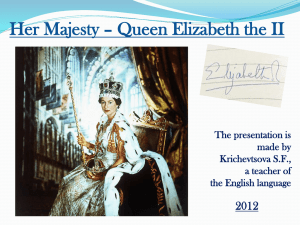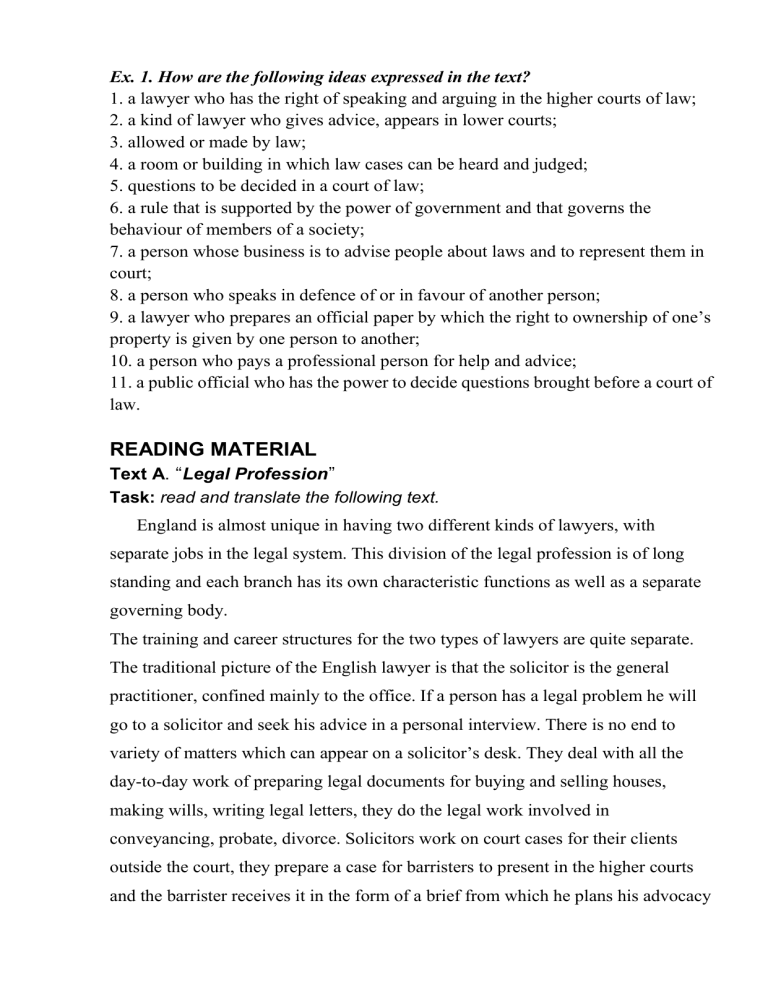
Ex. 1. How are the following ideas expressed in the text? 1. a lawyer who has the right of speaking and arguing in the higher courts of law; 2. a kind of lawyer who gives advice, appears in lower courts; 3. allowed or made by law; 4. a room or building in which law cases can be heard and judged; 5. questions to be decided in a court of law; 6. a rule that is supported by the power of government and that governs the behaviour of members of a society; 7. a person whose business is to advise people about laws and to represent them in court; 8. a person who speaks in defence of or in favour of another person; 9. a lawyer who prepares an official paper by which the right to ownership of one’s property is given by one person to another; 10. a person who pays a professional person for help and advice; 11. a public official who has the power to decide questions brought before a court of law. READING MATERIAL Text A. “Legal Profession” Task: read and translate the following text. England is almost unique in having two different kinds of lawyers, with separate jobs in the legal system. This division of the legal profession is of long standing and each branch has its own characteristic functions as well as a separate governing body. The training and career structures for the two types of lawyers are quite separate. The traditional picture of the English lawyer is that the solicitor is the general practitioner, confined mainly to the office. If a person has a legal problem he will go to a solicitor and seek his advice in a personal interview. There is no end to variety of matters which can appear on a solicitor’s desk. They deal with all the day-to-day work of preparing legal documents for buying and selling houses, making wills, writing legal letters, they do the legal work involved in conveyancing, probate, divorce. Solicitors work on court cases for their clients outside the court, they prepare a case for barristers to present in the higher courts and the barrister receives it in the form of a brief from which he plans his advocacy in the particular case. In a civil action solicitors have the right to speak in the lowest Courts when the case is one of divorce, recovering some debts, matrimonial matters, petty crimes. Law Society is a governing body of solicitors. To qualify as a solicitor a young man joins a practising solicitor as a “clerk” and works for him whilst studying part time for the Law Society exams. When you have passed all the necessary exams, you may apply to the Law Society to be “admitted”, then you can start business on your own. It is not necessary for you to go to university. In England, the decision is between becoming a barrister or a solicitor. Although solicitors and barristers work together on cases barristers specialise in representing clients in court. A barrister can only be consulted indirectly, through a solicitor. Thus they are not paid directly by clients, but are employed by solicitors. Most barristers are professional advocates but it is a mistake to regard a barrister entirely as an advocate. A barrister must be capable of prosecuting in a criminal case one day, and defending an accused person the next. Barristers are experts in the interpretation of the Law. They advise on really difficult legal matters (this is known as “taking counsel’s opinion”). So barristers spend a lot of time at paper work apart from their actual appearances in court where they wear wigs and gowns in keeping with the extreme formalities of the proceedings. Judges are usually chosen from the most senior barristers, and once appointed they cannot continue to practise as barristers. The highest level of barristers have the title QC (Queen’s Counsel) . The status is bestowed on about 30 counsellors a year by the Queen on the advice of the Lord Chancellor. Before a junior counsel can hope to achieve the status he must be able to point to at least 10 years successful practice as a barrister. The QC is expected to appear only in the most important cases. A would be barrister must first register as a student member of one of the four Inns of Court: Gray’s Inn, Lincoln’s Inn, Inner Temple or Middle Temple. A student must pass a group of examinations to obtain a Law degree and then proceed to a vocational course, highly practical in nature, the passing of which will result in his being called to the Bar . A lot of work in English solicitor’s offices is undertaken by managing clerks, now called “legal executives”, who are a third type of lawyers. They have their own professional and examining body – “The Institute of Legal Executives”. Taking the legal profession as a whole, there is one practicing lawyer per 1200 people. This compares with about one lawyer per 600 in the USA. There are about 5,000 barristers and 50,000 solicitors, a number which is rapidly increasing, and they make up by far the largest branch of the legal profession in England and Wales. Many people believe the distinction between barristers and solicitors should be eliminated in England. The government is considering various proposals, but there are arguments for maintaining , as well as removing, the division. Discussion Ex. 1. Choose the best way to complete the sentences. 1. England has two different kinds of lawyers: ..... a) solicitors and barristers b) barristers and legal executives c) solicitors and judges 2. Solicitors work on court cases of clients ..... a) in the court b) outside the court c) at home 3. ..... is a governing body of solicitors. a) the Bar b) the Highest Court c) Law Society 4. The highest level barristers have the title of ..... a) Queen’s Counsel b) Queen’s Advocate c) Senior Barrister 5. The status to the barrister is bestowed by the Queen on the advice of ..... a) the Lord Chancellor b) Prime Minister c) the Attorney-General 6. A would be barrister must first be registered ..... a) as a member of Law Society b) as a student member of one of the four Inns of Court c) as a member of the Bar 7. Many people believe the distinction between barristers and solicitors ..... a) should be adopted b) should be eliminated c) should be kept Ex. 2. Mark the statements which are true. 1. The division of the legal profession is of long standing and each branch has its own characteristic functions. 2. The training and career structures for the two types of lawyers are quite the same. 3. Solicitors specialize in representing clients in courts. 4. A barrister can only be consulted indirectly through a solicitor. 5. Barristers are paid directly by the clients. 6. A barrister is regarded to be an advocate. 7. In court, barristers wear wigs and gowns in keeping with the extreme formalities of the proceedings. 8. Judges are chosen from the most senior barristers and they can continue to practise as barristers. 9. Before a junior counsel can achieve the status of QC he must be able to point to at least 10 year’s successful practice as a barrister. 10. The government doesn’t consider it necessary to eliminate the distinction between barristers and solicitors. Learn the following words and phrases: a resident solicitor — to give smb the benefit of one’s advice — caller — tenant — to pay rent — provide — linen — to keep phoning up — to keep on at a person — to get smb down — Well, a couple of things there — to keep pestering — a court order for possession — to sue smb for harassment — to regain — to assume — the whole issue — to be protected by Legal Aid — to be obliged — sales items — a receipt — a purchase — bad customer relations —
